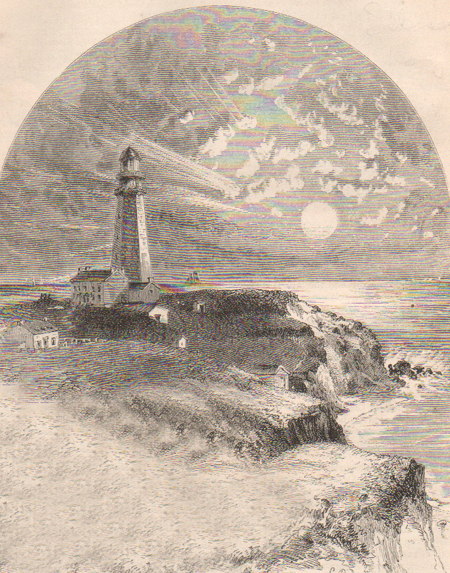
|

|
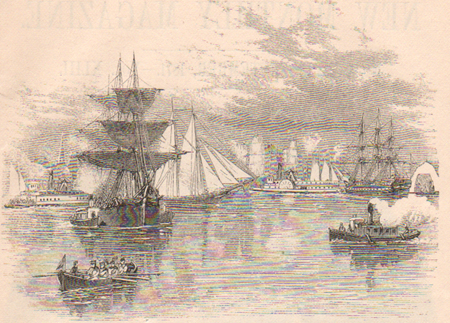
|
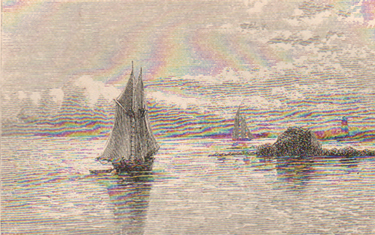
|
| "The
golden sea its mirror spreads
Beneath the golden skies, And but a narrow strip between Of land and shadow lies. |
| "The
cloud-like rocks, the rock-like clouds'.
Dissolved in glory float, And, midway of the radiant flood, Hangs silently the boat. |
| The
sea is but another sky,
The sky a sea as well, And which Is earth, and which the heavens, The eye can sesrceiy tell. |
| "So
when for us life's evening hour
Soft-fading shall descend, May glory, born of earth and heaven, The earth and heavens blend. |
| "Flooded
with peace the spirit float,
With silent. rapture glow, Till where earth ends and heaven begins The soul shall scarcely know." |
|
The sun has gone, and as the twilight deepens, the full, silver-faced moon
rises above the picturesquely wooded "Sands Point ;" and the Star in the
light-house grows in brilliancy as the darkness increases. We are loath
to leave the deck, but supper is ready, and our appetites sharpened by
the fresh air, persuade us to go below.
One hour later the pageant of the evening had dissolved, and now the moon looks down, throwing her silvery light in gentle ripples to our feet. The air is full of mystic softness. Our artist friend talks of the Mediterranean, of ' ter than we had anticipated, winding through Capri--its rocks and grottoes--of Venice, of Turner, the great interpreter, of life in Rome; and art, with all its inspiring memories, crowds upon us. The bachelor of our party chants in a Minor key, |

|
| "Ask
me no more: the moon may draw the sea;
The cloud may stoop from heaven and take the shape, With fold to fold, of mountain and of cape; But, oh, too fond, when have I answered thee? Ask me no more." |
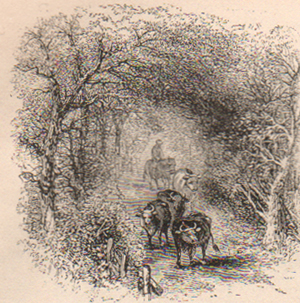
THROUGH A BEAUTIFUL LANE |
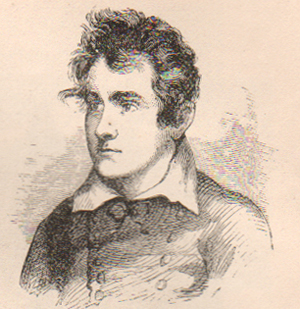
J. HOWARD PAYNE |
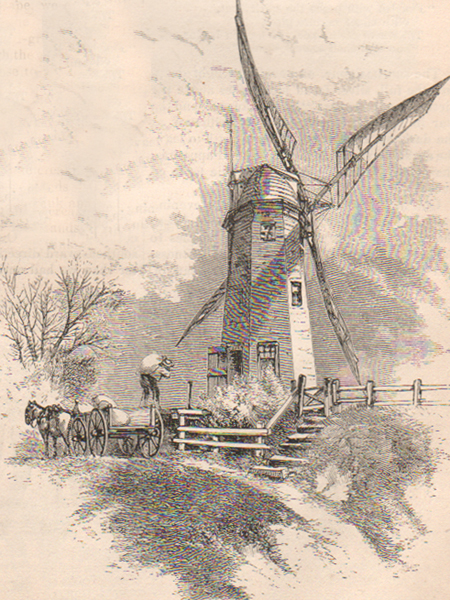
|
| "Amidst
the storm they sang;
And the stars heard and the sea: And the sounding aisles of the dim woods rang To the anthem of the free. "The ocean eagle soared From his nest by the white wave's foam, And the rocking pines of the forest roared: This was their welcome home." |
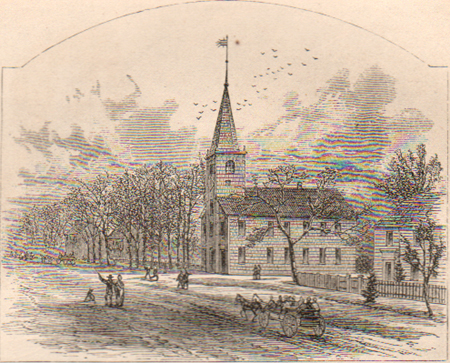
|
The "old church" represented in the vignette was built in 1717. The bell and clock are over a century and a quarter old. Its first pastor received for his support "forty-five pounds annually, lands rate free, grain to be first ground at the mill every Monday, and one-fourth of the whales stranded on the beach." On the death of Dr. Buel, the third pastor, in the year 1799, Rev. Lyman Beecher was settled over the church. Referring to Dr. Beecher's autobiography, we do not find that he makes any positive statement as to the addition made to his income through the misfortunes. of "stranded whales;" but we do learn, however, that ''as late as about 1700 it is said that a woman named Abigail Baker, in riding from East Hampton to Bridgeharnpton, saw thirteen whales along the shore between the two places." Dr. Beecber married immediately after his settlement, and the following narrative, communicated to his children, allows the difficulties which he and his wife encountered in setting up housekeeping. "There was not a store in town, and all our purchases were made in New York by a small schooner that ran once a week. We had no carpets; there was not a carpet from end to end of the town. All had sanded floors, some of them worn through. Your mother introduced the first carpet. Uncle Lot gave me some money, and I had an itch to spend it. Went to a vendue, and bought a bale of cotton. She spun it, and had it woven; then she laid it down, sized it, |
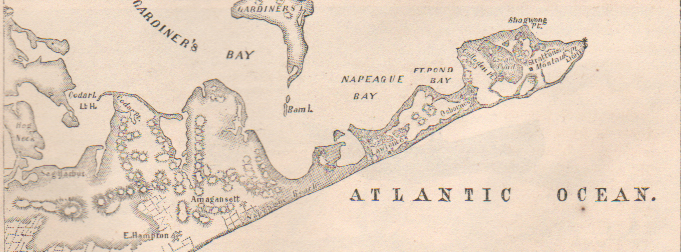
|

After breakfast we directed our steps toward the birth-place of Payne a
modest unpretending house, nestling under the shadow of the Academy building,
where his father, we were told, was once a tutor. How many touching associations
crowd upon us as we remember the many weary hearts whose thought and aspiration
have found expression through the singer who first saw the light in this
out-of-the-way nook, and whose fate it was to die away from home and kindred
in a foreign land!
|
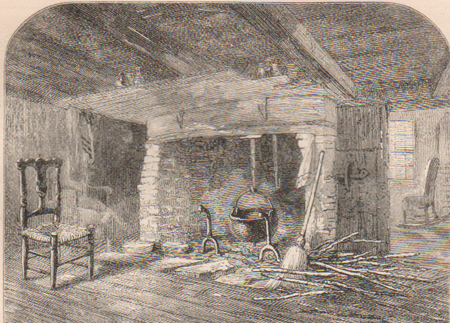
|
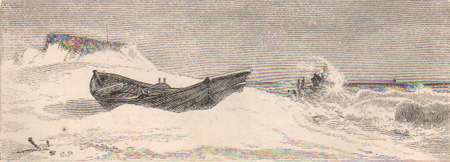
|
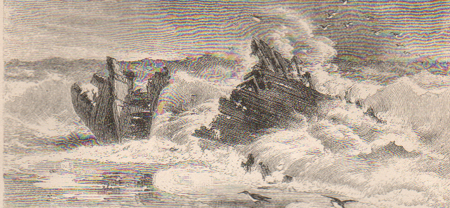
|
| "The
sunlight glitters keen and hrlght,
Where, miles away, Lies stretching to my dazzled sight A luminous belt, a misty light, And wastes of sandy gray." |
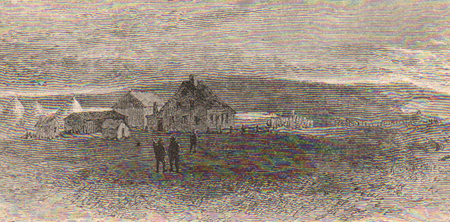
|
After dinner we continued our walk, following the coast till sundown; then on over the downs, through time deepening twilight into the gloaming, the music of the everlasting and monotonous roar of the sea sounding in our ears, until we reached Mr. Osborne's, near the beach, after dark. Soon we were comfortably seated in his cozy parlor, chatting with time family like old friends. An examination of the "register" revealed a very different record from the books of this kind usually found in hotels. Here we have a description of a successful day's sport - ducks, wild-geese, snipe. On another page regrets it leaving such home-like quarters. |

THE SHIPWRECK AT NIGHT |
| "Where
surge after surge would leap enorm,
Cliffs of emerald topped with snow, That lifted am! lifted, and then let go A great white avalanche of thunder," |
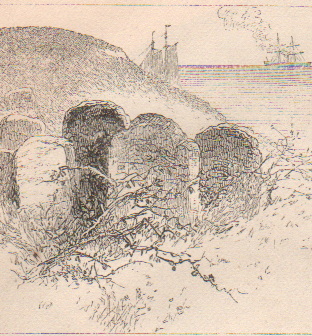
|
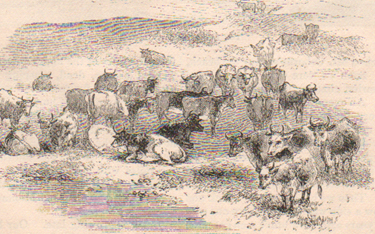
|
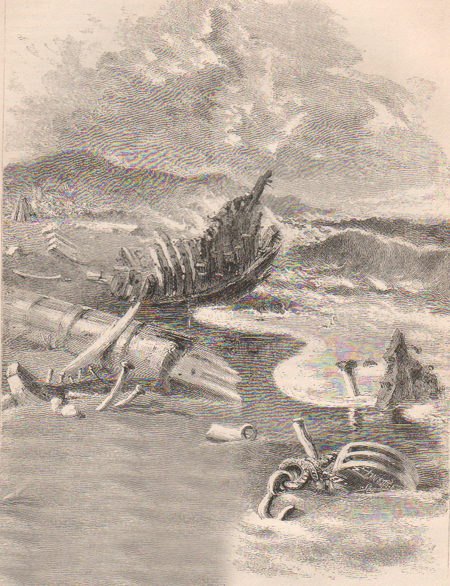
THE SHATTER OF THE SEA |
| We
walked beside the sea,
After a day which perished silently Of its own glory. "For
though we never spoke
|
| "Steadfast,
serene, immovable, the same
Year after year, through all the silent night, Burns on for evermore that quenchless flame, Shines on that inextinguishable light |
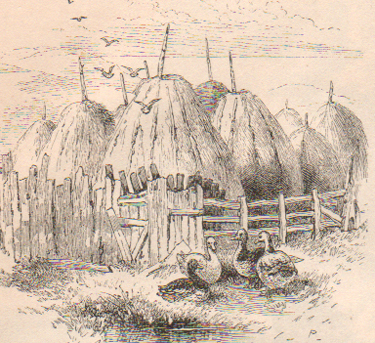
AGRICULTURAL PROSPERITY |

SCRUB-GROWTH |
Early the next morning we were sketching the sunrise, but the fishermen were up before us, trolling for blue-fish. We had arranged to have a team sent to take us off, and by eight o'clock we started homeward, the road leading over and around the knolls, at times following the beaten path, at others over the unbroken sod. To the left we caught a glimpse of the sea and the curved column of smoke on the distant horizon. Then we descended down into a deep dell, by the dry bed of a former pool, now covered with the dead leaves of the pond-lily. Rising again, to the north of us lies Gardiner's Island and the distant Connecticut shore, and still further eastward, in the faint blue distance, Rhode Island, and off due east from the Point, Block Island. The sky and water are an intense bhime, while the sand spits and points on the northerly side look like golden beaches in the morning light. Now and then we pass clumps of scrub-growth clad in russet and gold. |
| The mark of Wianambone, |
|
| The mark of Sachem Aqua, |
|
| The mark of Zuquabone, |
|
| The mark of Shobanow, |
|
| The mark of Massaquit, |
|
| The mark of Yombo, |
|
| A further bond, made by Wyandanah and Sassakatako, sachems of Montauket, 1687 with the consent of the Montauket Indians, conveyed to the trustees of the freeholders of ye town of East Hampton "all the tract of laud at Moutauket, from sea to sea." And the trustees, for themselves and the freeholders, engaged that the Indiatis "have leave to plant what corn soever they have occasion for to plant from time to time, where they see cause, themselves and their heirs forever, upon the land as purchased of them by us." The two hundred descendants of the original purchasers are waiting for the time when the tribe will be extinct, and there shall be no lien upon the land, The Indians are said to be idle and worthless, except their king and queen, who are industrious, quiet citizens. The king, David Pharaoh, was that day attending court at Riverhead; therefore we concluded it would not pay to visit them. |
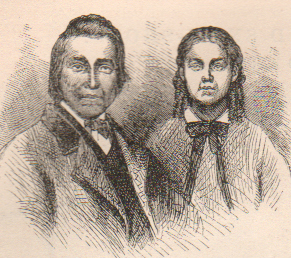
KING AND QUEEN OF THE MONTAUKS |